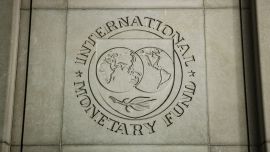The Islamic State group on Tuesday claimed a series of bombings that killed more than 320 people in Sri Lanka, and released a photo of the men it said were responsible.
The massive casualty toll would make the Easter attacks the deadliest overseas operation claimed by IS since the group proclaimed its worldwide caliphate in mid-2014.
"Those that carried out the attack that targeted members of the US-led coalition and Christians in Sri Lanka the day before yesterday are Islamic State group fighters," said a statement released by IS propaganda agency 'Amaq.'
In a later statement, the group gave the noms de guerre of seven people who it said were behind the "blessed attack" that targeted Christians during their "blasphemous holiday," referring to Easter.
It also released a photo of eight men it said were behind the blasts. Seven of them had their faces covered and three of them held knives. The one man who displayed his bearded face also appeared to carry an assault rifle.
The authenticity of the image could not be independently verified and the reason for the discrepancy in the reported number of attackers was not immediately clear.
Sunday's bombings targeting churches and high-end hotels are among the deadliest such attacks worldwide since the 2001 strikes on the United States.
The Sri Lankan government on Tuesday blamed the Islamist National Thowheeth Jama'ath (NTJ) group for the blasts, saying they were carried out in retaliation for last month's attacks on two mosques in New Zealand.
The presidency said there was intelligence that "international terror groups" were backing Sri Lankan extremists.
Police sources told AFP Tuesday that two Muslim brothers – sons of a wealthy Colombo spice trader – were among the perpetrators of the attacks.
They blew themselves up as guests queued for breakfast at the Shangri-La and Cinnamon Grand hotels in the capital, the source said.
The pair were key members of the NTJ, which the government has previously blamed for defacing Buddhist statues, according to an investigation officer.
The IS statement on Tuesday said three fighters it named as Abu Obeidah, Abu Baraa and Abu Moukhtar were behind the attacks on the Shangri-La, Cinnamon Grand and Kingsbury hotels.
Three other fighters it named as Abu Hamza, Abu Khalil and Abu Mohammad carried out attacks on three different churches in the cities of Colombo, Negombo and Batticaloa, it said.
The seventh fighter, Abu Abdallah, killed three police officers in an attack in a Colombo suburb, it said.
Tuesday's claim comes one month after a Kurdish-led Syrian force announced the fall of IS's self-declared "caliphate," after routing jihadists from their last holdout in east Syria with backing from a US-led coalition.
The jihadists retain a global network of recruits and have claimed attacks in Iraq, Syria and beyond.
On Sunday, IS claimed responsibility for an attack that killed 10 people in the Afghan capital of Kabul the previous day.
In response to the bombings, Sri Lanka's president on Tuesday vowed a major shake-up of the military's top brass, after the government admitted warnings were ignored.
Prime Minister Ranil Wickremesinghe has acknowledged that police had intelligence about the suicide strikes against churches and luxury hotels before the bombings on Sunday, but failed to act on it.
President Maithripala Sirisena, who is also defence and law and order minister, said he will carry out a complete reorganisation of the security forces and the police under his control.
"I hope to make major changes in the leadership of the security forces in the next 24 hours," the president said in a nationwide address. "The restructuring of the security forces and the police will be completed within a week."
-TIMES/AFP


























Comments